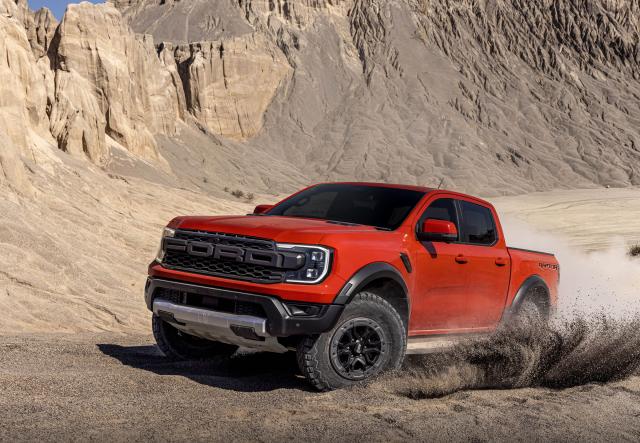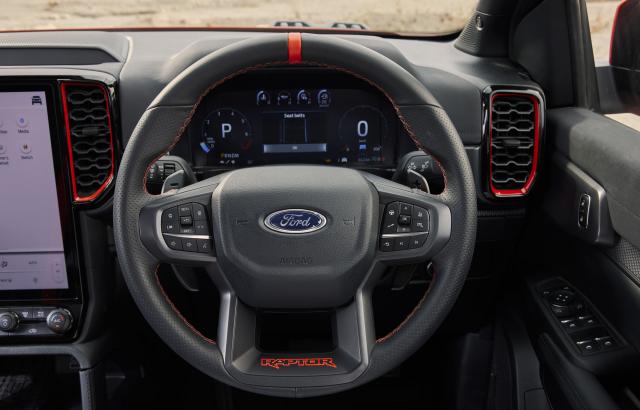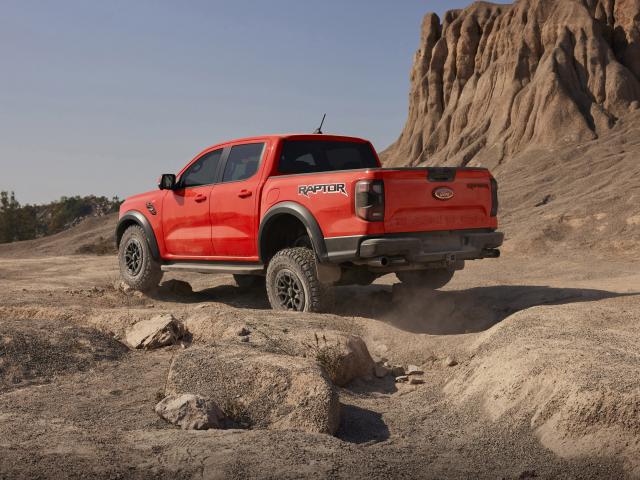Driving the Ranger Raptor can give you a sore throat. Pull up, climb down and most likely someone will be standing there wanting you to fill them in on the workings of Ford’s super ute.
There again, probably it was the sunset Sedona Orange duco of the test vehicle that had caught his or her eye. Generally, a long list of questions had to be answered before parting company with the onlooker of envious eye. Hence the driver’s dry throat.
The last time this happened was years ago when a bunch of bikies bailed me up demanding info on the Mercedes-Benz SL 500 I was trying out.
The 2023 dual cab Raptor lives up to its wild-world moniker representing the bird of prey in all its elusive power and engaging street presence, the latter emphasised by contrasting black wheels and signature grille, plus ‘RAPTOR’ decals on its flanks.
The Ranger Raptor has been around for a while, four years to be exact, and like its predecessor, the latest generation, developed by the Australian design and engineering team with Ford Performance DNA, relies on Ford’s F-Series trucks for its pedigree. However, the newbie, with its own looks and more power, is streets ahead of the ‘old bird’.
However, so is the price – $85,490, plus on-road costs, as opposed to $74,900, plus on-roads. To my mind, the MY23 Ranger Raptor carries off the extra ‘load’ well. Opposition includes Nissan’s Pro4-X Warrior and Toyota HiLux Rogue.
STYLING
The Ranger Raptor is surprisingly restrained in exterior looks – flashy chrome is conspicuous by its absence – relying on dark F-O-R-D block letter radiator grille, grey wheel arch extensions and functional fender vents, and black powder coated die-cast aluminium side steps. Matrix LED headlamps are accompanied by LED daytime running lights and front fog lamps. LED tail lamps can be found out the back with a rear bumper with integrated step pad and towbar.
Tow hooks front and back share company with front bash plate made from 2.3 mm-thick steel, while an optional factory fitted power roller shutter seals the lined tub from the weather.
INTERIOR
Ford Performance seats embossed with Raptor signature logo, suede inserts and orange highlights and stitching. Up front they are firm yet comfortable and supportive during spirited cornering. The rear bench is wide enough to take three adults.
The sports steering wheel has room for a selection of controls including selective drive modes and paddle gear shifters. Storage is made up of a deep centre console bin and phone charge pad.
Triple stack of glove compartments is designed to take stuff of multiple size and shape. Doors incorporate bottle storage and cup holders pop out from the outer dash.
INFOTAINMENT
A centre mounted tablet-style 12-inch touchscreen with a Ford SYNC 4A system and wireless Apple CarPlay and Android Auto connectivity.
There’s a 12.4-inch configurable digital instrument cluster directly in front of the driver, while the Bang and Olufsen audio has its quirks operating the on-screen controls. The sound could be sharper too.
Half a dozen factory-fitted ready-wired auxiliary switches are handily sited in the roof, while the door release is not so, being a horizontal lever hidden inside the door pull.
SAFETY
The Ranger’s five-star ANCAP score cannot be extended to the Raptor because of differences in such things as engine size and ride height. However, the list of safety features includes autonomous emergency braking, adaptive cruise control with stop-and-go, traffic sign recognition, blind-spot monitoring with rear cross-traffic alert, lane-departure warning and lane-keep assistance, automatic headlights and high-beam, 360-degree camera, front and rear parking sensors, tyre pressure monitoring, and intelligent speed limit assistance.
DRIVING
For a start (literally) there was a surprising amount of turbo lag: unusual with the advanced turbo tech of today. However, late in the test I discovered the racy Baja anti-lag system that, at the touch of a button, enables rapid delivery of boost on demand. Thus engaged, the ute fairly flew off the mark accompanied by a unique and full-on exhaust note.
Ford claimed an optimistic fuel consumption of 11.5 litres per 100 kilometres on the combined urban / highway cycle with 98 RON premium unleaded, the test vehicle could do no better than 13.5 litres per 100 kilometres in a range of driving conditions.
The driver has access to a plethora of selectable drive, steering, damper and exhaust modes, all of which can be lumped into one at the touch of a single button. Trail Control comes in handy off road, helping to maintain constant speeds up or down varying terrain, while unique 17-inch optional beadlock-capable wheels are designed to minimise damage from rocks while off-road driving.
SUMMARY
Despite the odd stumble, when all the talking ceased, the Ford Ranger Raptor showed itself to be worthy of its elevated position in the species. Streets ahead of the Raptor it replaces.











